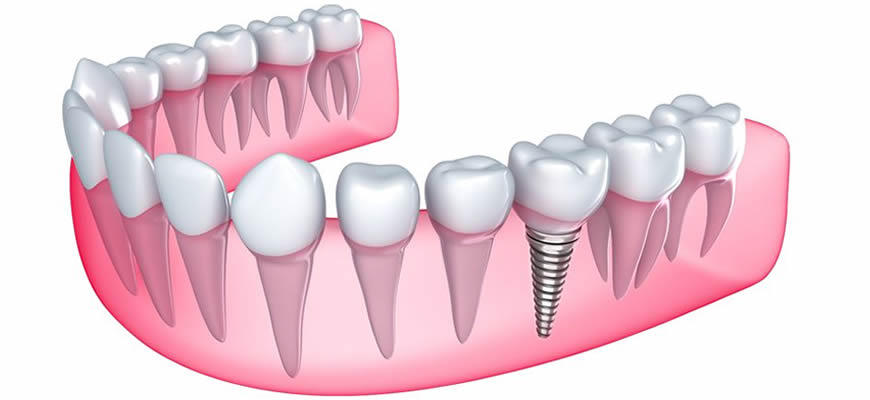
Dental implants are the most durable and functional tooth replacement option available today. The implant is comprised of a titanium post that serves as the root of your replacement tooth, a porcelain crown, and an abutment that attaches the crown to the implant. With proper oral care, a dental implant can replace a natural tooth for a lifetime.
Benefits of Dental Implants
- Convenience. Once the implant is placed, it serves all the functions of a natural tooth. No eating restrictions or speaking impediments.
- Oral health. With other tooth replacement options, the bone where the root used to be may deteriorate over time, causing neighboring teeth to shift and loosen. Implants are the only option that helps prevent bone loss in the jawline.
- Reliability. Implant placement surgery is one of the most effective types of surgery with a success rate of over 95%.
- Confidence. Implants are nearly indistinguishable from natural teeth. Smile more often with a full, healthy set of teeth.
Placing the Implant
First, Dr. Karas will take x-rays of your mouth and determine the optimal placement of the implant along your jawline. Once the implant has been surgically placed, the abutment and crown will be attached during restoration procedures. Most patients report less pain during recovery than with wisdom teeth extractions, but any discomfort can be treated with over-the-counter pain medication. If you are anxious about any stage in the implant procedure, the team at Oak Brook Dental Center is always ready and willing to answer any questions or concerns you may have.
Stages of Dental Implant Treatment
- The titanium implant is placed into your jaw. Over the next few months, the implant and bone osseointegrate (grow together).
- Once the implant is integrated with your bone, an abutment is placed on the dental implant.
- A replacement tooth is then attached to the abutment for a beautiful, natural appearance.
Replacing Multiple Teeth
When several neighboring teeth are missing, an implant-supported bridge is the optimal treatment option for replacing them. The implant bridge consists of three major aspects: dental implants, abutments, and the dental bridge. While a traditional bridge uses healthy neighboring teeth to secure the dental crowns in your mouth, the implant-supported bridge is firmly held in place by the implants.
Unlike a traditional bridge, the implant bridge supports bone growth in addition to replacing the exterior appearance of teeth. When multiple neighboring teeth are missing, the bone begins to resorb and shrink at a rapid pace. The surrounding teeth will then begin to shift and move into the open space, possibly causing greater damage to your remaining teeth. The implant bridge not only replaces missing teeth, it actively prevents further tooth loss as well.
Advantages of a Dental Implant Bridge
Unlike a traditional bridge, the implant bridge supports bone growth in addition to replacing the exterior appearance of teeth. When multiple neighboring teeth are missing, the bone begins to resorb and shrink at a rapid pace. The surrounding teeth will then begin to shift and move into the open space, possibly causing greater damage to your remaining teeth. The implant bridge not only replaces missing teeth, it actively prevents further tooth loss as well.
Advantages of a Dental Implant Bridge
- Efficient chewing
- Normal biting force and sensation
- Natural appearance
- Preservation of bone
- Preservation of natural tooth structure
Replacing All Teeth
While some patients opt for removable dentures, this option can be burdensome and cause sores along the gums. Another option for replacing a full set of teeth is a full-arch fixed bridge. These dentures are anchored to the jawbone by multiple implants. The process for placing the implants is similar to that of a single dental implant in that your oral surgeon will carefully insert titanium “roots” in your jawbone. The number of implants will be determined during consultation with Dr. Karas after examining the condition of the bone in your mouth. Once the implants are placed, you will be fitted with a custom set of crowns that will be fixed to the implants. Once implanted and with proper oral hygiene, fixed bridge dentures can serve all of the functions of a natural set of teeth.
You may also be a candidate for implant-supported overdentures. Implant-supported overdentures are a full set of dentures that clip into place along your jawline to perform the appearance and function of natural teeth. Like the full-arch fixed bridge denture, the overdenture is supported by dental implants. However, the overdenture can be removed for cleaning and maintenance. Your oral surgeoun will attach a supporting structure to the implants so that you can snap your overdentures into place for increased stability and comfort while eating, drinking and speaking.
With proper care, fixed bridge dentures and implant-supported overdentures can provide permanent solutions to the problems created by multiple missing teeth.
You may also be a candidate for implant-supported overdentures. Implant-supported overdentures are a full set of dentures that clip into place along your jawline to perform the appearance and function of natural teeth. Like the full-arch fixed bridge denture, the overdenture is supported by dental implants. However, the overdenture can be removed for cleaning and maintenance. Your oral surgeoun will attach a supporting structure to the implants so that you can snap your overdentures into place for increased stability and comfort while eating, drinking and speaking.
With proper care, fixed bridge dentures and implant-supported overdentures can provide permanent solutions to the problems created by multiple missing teeth.
